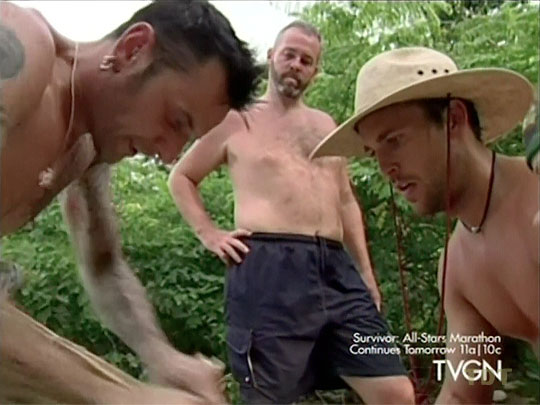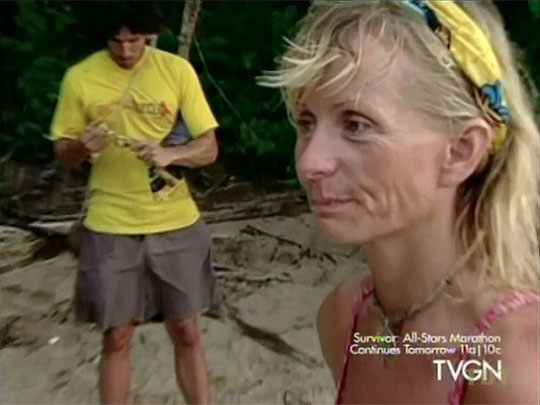
This was, at the time, a BIG event in Survivor's history. For the first time, players from previous seasons were brought back to play again, with some of the show's biggest names squaring off against each other. Over the years, though, as returnee appearances have piled up at ever-increasing rates, that aspect has faded in its novelty, leaving what, by most fan assessments, is not one of Survivor's best seasons. And this episode backs that up. Reflexive, thought-free strategy, preening for the cameras, and a general sense of entitlement are all on display. Still, as we re-watch this season 10 years later, there are also some great and (in retrospect) surprising moments, all of which we'll discuss below.
Overall, the problem with this episode seemed to be the lack of legitimate drama (as in, non-manufactured by the contestants for attention). While much was made editorially about the spartan conditions of the camps, none of the contestants seemed particularly upset about it. Sure, Alicia complains about it, but not particularly compellingly, and the rest of Chapera spends every available moment snickering about it. Rudy's "I've drank bad water all over the world" comment reveals the lack of dire consequences. Also, the choice to hold the immunity challenge on Day 2 minimizes some of the footage of suffering for which production was clearly hoping. They've only been out there for a little over 24 hours, so the collective shrugs seem justified, and then we don't see Chapera or Mogo Mogo for the rest of the episode. Odd.
Arriving in style
The military escort sequence at the open is hilarious, both in the datedness of the graphics, and the mock-seriousness of Probst's narration. But in truth, getting jetted in via speedboat is about as far as possible from the jumping-off-a-ship marooning that opened the Borneo season. To be fair, the lack of supplies the contestants discover upon reaching their respective camps makes up for that. Or at least it would, if as returning players, they weren't wise enough to assume, "Yeah, we'll just pick stuff up at the next reward challenge. No biggie." As far as we can tell, the entitled attitude began here. This is Survivor, not a Duran Duran video.
Oh? There are cameras rolling? I barely noticed!
 Hatch's
refusal to help with making fire, paired with his chuckling in
confessional that "Oh sure, I could make fire in a second," comes
across as completely phony. Contrast this with his sitting in the
tree in Borneo: that had an actual purpose, he wanted
everyone on Tagi to stop, think logically about what was needed,
then decide as a group what needed to be done, in what order. His
appearance here? It's like following up a surprise hit movie with
a poorly thought-through sequel that covers pretty much exactly
the same ground, and hoping for the same, massive box office.
Shockingly, it doesn't work. Everyone on his tribe knows what he's
up to. Their eye-rolling groans at this and "Oh, here's where
Hatch gets naked... again" are not lost on the audience.
Hatch's
refusal to help with making fire, paired with his chuckling in
confessional that "Oh sure, I could make fire in a second," comes
across as completely phony. Contrast this with his sitting in the
tree in Borneo: that had an actual purpose, he wanted
everyone on Tagi to stop, think logically about what was needed,
then decide as a group what needed to be done, in what order. His
appearance here? It's like following up a surprise hit movie with
a poorly thought-through sequel that covers pretty much exactly
the same ground, and hoping for the same, massive box office.
Shockingly, it doesn't work. Everyone on his tribe knows what he's
up to. Their eye-rolling groans at this and "Oh, here's where
Hatch gets naked... again" are not lost on the audience.
Still a few tricks left in the old Hatch
In contrast, Richard's keen awareness of attempted fresh-off-the-boat alliance-making among the women, which he managed to back up by simply observing them actually doing it, then catching Kathy red-handed, was masterful. Maybe in the current age of alliances being made in the first few minutes after the contestants are allowed to speak to each other, this isn't so shocking any more. But Hatch was both hyper-aware of it, and willing to turn what was even then seen as overplaying against those playing. In a lot of ways, Hatch is a true pioneer, even if his semi-scripted work in the previous section was sadly also a harbinger of over-actors to come.
Reduce, reuse, recycle
 This
episode's sole challenge was a slightly re-worked version of the
very first Survivor challenge, Borneo's "Quest
for Fire." Normally, we're not huge fans of repeated challenges,
but in an all-stars season, the revisiting of challenges in which
some (but not all) of the returnees have previously competed adds
an interesting twist. Furthermore, we're always in favor of the
opening challenge using lighting a fire as its central concept.
It's part of the Survivor symbolism ("fire is life")
that has been lost over the years (especially during Redemption
Island seasons). We're not really sure how Mogo Mogo managed to go
from first-to-the-beach to almost losing to Saboga during the
short crawl under the final obstacle, especially since they didn't
have Jenna Lewis sitting on their raft for half the challenge. But
all in all, this was a solid first challenge.
This
episode's sole challenge was a slightly re-worked version of the
very first Survivor challenge, Borneo's "Quest
for Fire." Normally, we're not huge fans of repeated challenges,
but in an all-stars season, the revisiting of challenges in which
some (but not all) of the returnees have previously competed adds
an interesting twist. Furthermore, we're always in favor of the
opening challenge using lighting a fire as its central concept.
It's part of the Survivor symbolism ("fire is life")
that has been lost over the years (especially during Redemption
Island seasons). We're not really sure how Mogo Mogo managed to go
from first-to-the-beach to almost losing to Saboga during the
short crawl under the final obstacle, especially since they didn't
have Jenna Lewis sitting on their raft for half the challenge. But
all in all, this was a solid first challenge.
Eighteen people? Who has the time?
It's strange to remember how crazy the 18-contestant format seemed at the time. It required an unthinkable departure from the then-canonical one-boot-in-three-days-per-episode format of the first seven seasons. What's more, there were two more people's confessionals to cram into the premiere. It's quaint to think back to this time, when the editors actually bothered trying to do that. Seriously, a full eighteen returning players, and they thought the audience wanted to hear from each and every one of them? What a concept!
The sad lament of the early boots
 One
of the hazards of the three-tribe format is that early targets
have limited ability to maneuver. If just two people are rigidly
set on booting someone, that person needs to convince all
three remaining tribe members to thwart that action. And in
a season where Jerri and Jenna Lewis's anti-winner crusade had a
large number of at least casual buy-ins, there was little chance
of Tina escaping the first boot, no matter how charming she might
be, no matter how convincing Ethan's argument to Rupert was, no
matter how little Jenna L. contributed in the first challenge. Rob
Cesternino ran into the same two-headed obstacle in Chapera,
giving his early confessional excitement at seeing all the
returnees all that much more pathos-laden irony. It feels awkward
for us to admit this, but: if only they'd had the threat of hidden
idols to lubricate the counter-strategy.
One
of the hazards of the three-tribe format is that early targets
have limited ability to maneuver. If just two people are rigidly
set on booting someone, that person needs to convince all
three remaining tribe members to thwart that action. And in
a season where Jerri and Jenna Lewis's anti-winner crusade had a
large number of at least casual buy-ins, there was little chance
of Tina escaping the first boot, no matter how charming she might
be, no matter how convincing Ethan's argument to Rupert was, no
matter how little Jenna L. contributed in the first challenge. Rob
Cesternino ran into the same two-headed obstacle in Chapera,
giving his early confessional excitement at seeing all the
returnees all that much more pathos-laden irony. It feels awkward
for us to admit this, but: if only they'd had the threat of hidden
idols to lubricate the counter-strategy.
ADVERTISEMENT